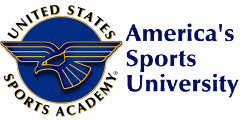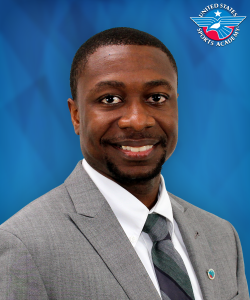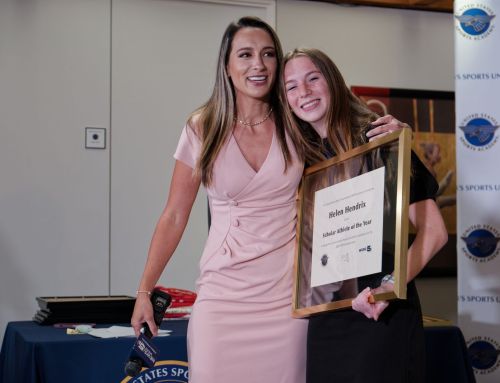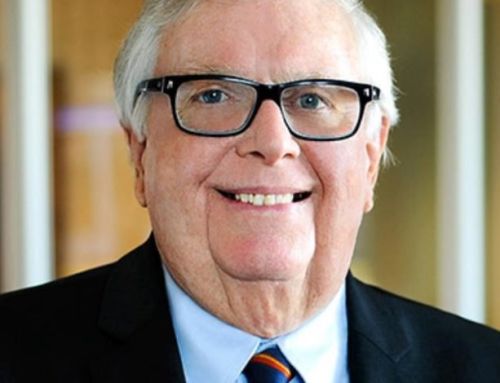DAPHNE, Ala. – United States Sports Academy director of sports management Dr. Brandon Spradley, who has been heavily involved in addressing the issue of concussion in sports, has been named as a reviewer for an international academic journal focused on the study of concussions.
Spradley will review articles for the Journal of Concussion, a peer reviewed, open access journal devoted to a multi-disciplinary, broad-based approach to head injuries and their care. The journal encourages concussion-related research in neurosurgery; neurology; psychiatry; ear, nose and throat; physiotherapy; rehabilitation; sport; transport and epidemiology. It is published by Sage Publishing, which has offices in Los Angeles, London, New Delhi, Singapore and Washington, D.C.
“My job is to review submissions to make sure they are relevant to the area of concussion study,” Spradley said. “I will be reading to make sure the writers’ methodology makes sense. Do the results presented make sense? Did the researcher go through the right process to come to the conclusion?”
Spradley earned his Doctor of Education degree in sports management from the Academy, where his dissertation focused on concussion awareness and education. He researched the King-Devick Test, a groundbreaking method for identifying athletes with head trauma. The test provides athletes with a baseline reading that athletic trainers and doctors can then use as a gauge to test athletes after a possible concussive event.
Dr. Steve Devick was given the Academy’s 2011 Dr. Ernst Jokl Sports Medicine Award for his work in developing and promoting the test. The Jokl award is given annually to an individual for his or her contributions to the growth and development of sport medicine through practice and/or scholarly activity.
“My dissertation looked at baseline testing for concussion, using the King-Devick Test,” Spradley said. “I met Dr. Devick and became interested in the test he developed. He conducted numerous research studies showing how effective his test was in detecting signs of concussion, so that coaches and trainers would be knowledgeable about when they needed to remove an athlete from play.
“With my dissertation, I was looking at the effectiveness of the test for the baseline requirements,” Spradley said. “I studied the difference in getting an athlete’s baseline test in a quiet setting versus getting the baseline after practice. I came to the conclusion that the test is more effective if you get a baseline after practice, so that the athlete’s baseline is based on how their body is immediately after play. Athletes had significantly improved baselines when the test was taken after exercise. That way, when the test is taken during play, the baseline is more accurate to use as a guideline to remove them from play.”
Spradley has been a key member of a team of Academy faculty who have played a role in encouraging and implementing concussion research and education programs across Baldwin and Mobile counties on Alabama’s Gulf Coast, including a program in concert with the University of South Alabama to mitigate the impact of concussion among football players in the Mobile County Public School System.
“We must continue to do due diligence on the concussion, not only through research but also by applying the research in a practical way at the high school and youth sports levels,” Spradley said.
“We must educate coaches, athletes and parents about what the research says about concussions. The Academy is in a perfect position to do that because we have access to all the research and the ability to bring it to the public’s attention.”
Spradley said the public has gradually become more aware of concussion-related injury and issues because of high profile cases in the NFL and professional sports.
“We see all these stories about concussions in the media, and I think generally the public is more educated about concussions because of it,” Spradley said. “Many people who used to play football will tell you they probably had a concussion or two, but they were told to ‘rub some dirt on it’ because back then, we didn’t really understand the issue.
“But today, professional and collegiate athletes understand it and now parents of youth athletes are starting to get a better idea of what concussions are and how to spot the signs. You can’t necessarily see a concussion right away in the same way you’d see a broken leg or something like that. You have to know the signs, which are often hidden at first. That’s why education is important.
“I do think broader concussion education will have an impact on the world of sports, especially at the youth level,” Spradley said. “I think we may see a decrease in youth sports participation, especially in football, because parents are more aware of concussion issues than ever before.
“It is important that we teach young athletes to have the right attitude and mindset toward concussions and to improve their behavior and willingness to report concussion symptoms,” Spradley said. “We have to do everything we can to educate people to be more aware of concussions so that the sports we play are as safe as they can be.”
The United States Sports Academy is an independent, non-profit, accredited, special mission sports university created to serve the nation and world with programs in instruction, research and service. The role of the Academy is to prepare men and women for careers in the profession of sports.
The Academy is based in Daphne, Ala. For more information, call (251) 626-3303 or visit www.ussa.edu.






